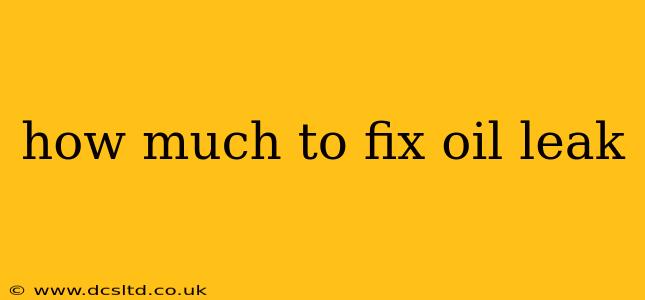How Much Does it Cost to Fix an Oil Leak? A Comprehensive Guide
An oil leak can be a frustrating and costly car problem. The price to repair it, however, varies wildly depending on several factors. This guide breaks down the costs, helping you understand what influences the final bill and how to prepare.
Understanding the Variables Affecting Oil Leak Repair Costs
Several factors significantly impact the final cost of fixing an oil leak:
-
Location of the Leak: A leak originating from a readily accessible part, like the oil drain plug, is generally cheaper to fix than one deep within the engine requiring extensive disassembly. A simple tightening of the drain plug might cost only the labor for a short service appointment, while a leaking valve cover gasket could require significantly more time and therefore expense.
-
Severity of the Leak: A slow drip is less urgent and often less expensive to repair than a substantial leak requiring immediate attention. A minor leak might only necessitate replacing a gasket, while a major leak might involve replacing seals, components, or even performing more extensive engine work.
-
Vehicle Make and Model: The complexity of the engine, accessibility of parts, and the cost of replacement parts vary considerably across different makes and models. Luxury cars, for instance, often have more complex engines and pricier components than budget-friendly models.
-
Labor Rates: Mechanic labor rates fluctuate widely depending on location, shop type (dealership vs. independent), and the mechanic's experience. Dealership labor rates are typically higher than independent shops.
-
Parts Cost: The cost of replacement parts, including gaskets, seals, and other components needed for the repair, can also vary substantially based on the vehicle's make, model, and the specific part being replaced. OEM (Original Equipment Manufacturer) parts are usually more expensive than aftermarket parts.
H2: How Much Can I Expect to Pay?
It's impossible to give a precise number without a proper inspection. However, here's a general range:
-
Minor Leaks (e.g., tightening a bolt, replacing a simple gasket): $50 - $300. This typically covers the cost of parts and a relatively short labor time.
-
Moderate Leaks (e.g., replacing a valve cover gasket, oil pan gasket): $300 - $1000. This range accounts for more extensive labor and potentially higher part costs.
-
Major Leaks (e.g., crankshaft seal replacement, extensive engine work): $1000+. Major leaks often involve significant disassembly, specialized tools, and substantial labor time, resulting in higher costs. In severe cases, engine rebuilds or replacements might be necessary, pushing the cost into several thousands of dollars.
H2: What are the Signs of an Oil Leak?
Recognizing an oil leak early is crucial to preventing more extensive (and expensive) damage. Look out for these signs:
- Oil stains on your driveway or garage floor. This is the most obvious sign.
- Low oil level on your dipstick. Regularly checking your oil level is vital.
- A burning smell coming from your engine. This indicates oil is burning on hot engine parts.
- Smoke from the exhaust (blueish smoke often indicates burning oil).
- A ticking or tapping noise from your engine. This could indicate low oil pressure.
H3: Can I fix a small oil leak myself?
For very minor leaks, like a loose drain plug, you might be able to fix it yourself with basic tools. However, tackling more complex leaks is generally best left to a qualified mechanic. Incorrect repairs can lead to more significant engine damage and increase overall repair costs.
H3: How often should I check my oil level?
It's recommended to check your oil level at least once a month, or more frequently if you notice any signs of a potential oil leak.
H3: What are the consequences of ignoring an oil leak?
Ignoring an oil leak can lead to catastrophic engine damage, including seized bearings, scored cylinders, and ultimately, engine failure. This can result in extremely expensive repairs or even the need to replace the entire engine.
Conclusion:
The cost to fix an oil leak is highly variable. A thorough inspection by a qualified mechanic is essential to accurately assess the problem's severity and obtain a realistic estimate. Don't delay addressing an oil leak; early intervention is key to preventing costly repairs and protecting your engine's health.
